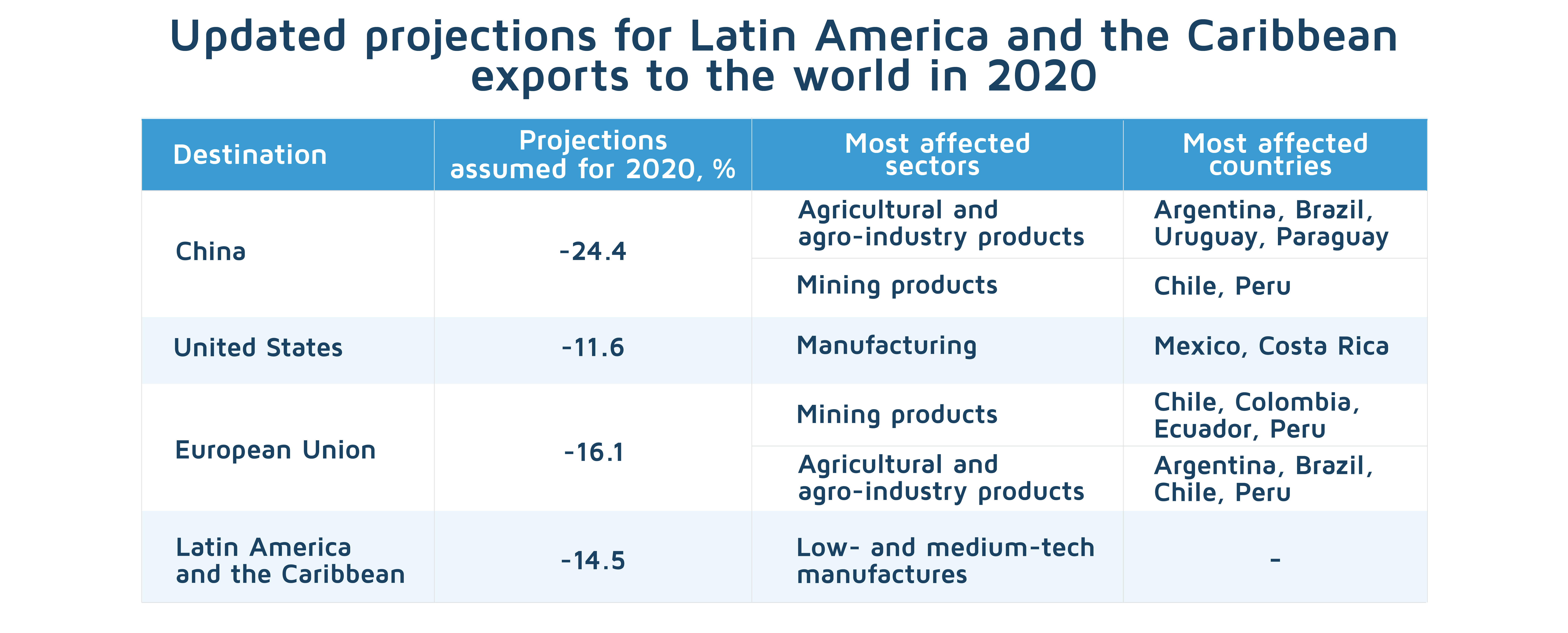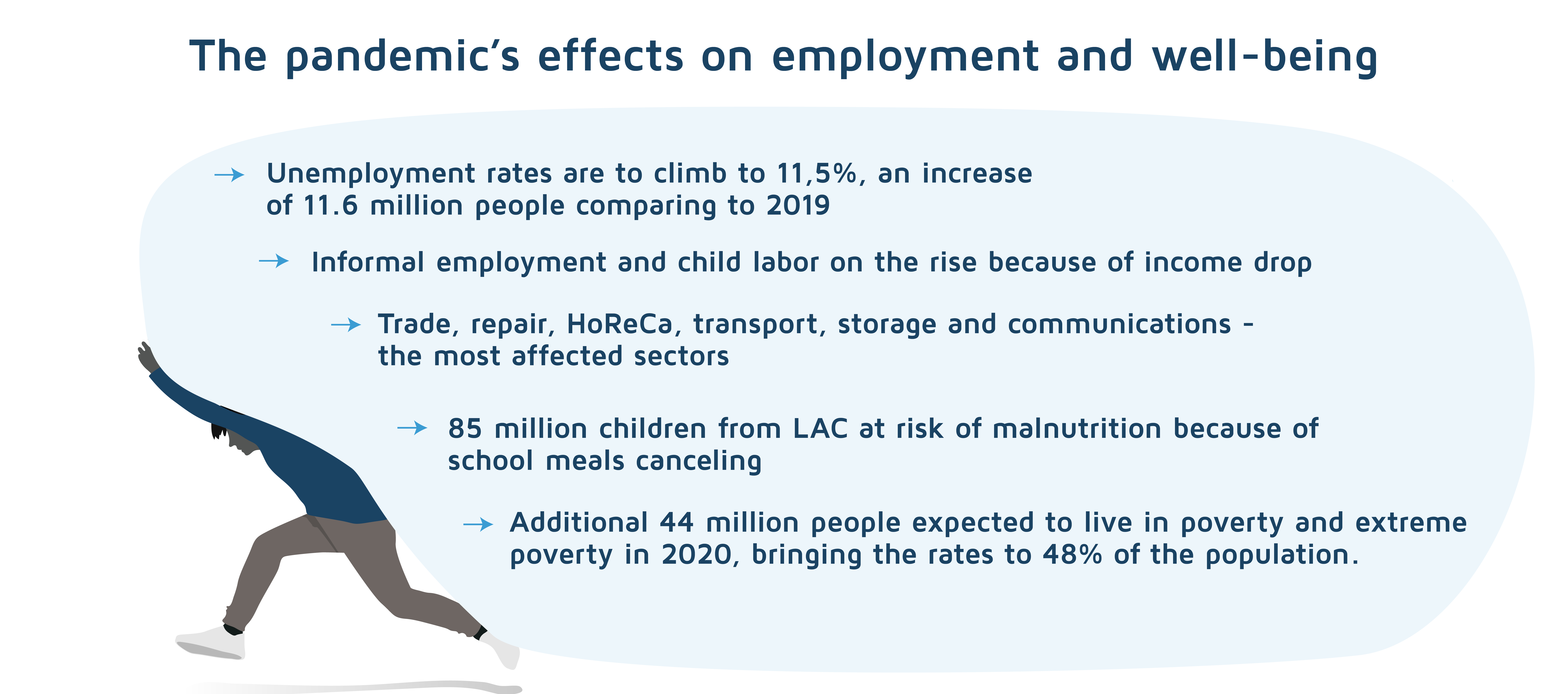Fragile economies, political challenges, precarious health systems and unequal social policies pose a great threat to the countries of Latin America and the Caribbean. Facing the pandemic from a weaker position, the population of the region are likely to face the worst-case scenario. The irreversible impacts of the coronavirus outbreak will generate the largest contraction in the economic history of the region since the great recession affected the well-being of those communities.
On the brink of the worst economic contraction since the great recession
As the pandemic evolves, the GDP growth in the region is poised to contract by 5.2% in 2020. Heavily reliant on exports, the projections for Latin America and the Caribbean reveal a decrease in commodity prices, tourism revenue and remittances. Under these circumstances, structural changes in the organization of production and international trade are inevitable. The oil exporting countries of Mexico, Venezuela, Ecuador and Colombia that head the list are expected to register the most severe drop in foreign trade, registering a fall in prices to 1980s levels.
The value of commodity exports will suffer the most in South America. The largest suppliers of products to China will be particularly affected since exports to this destination will fall by almost 25%. The slowdown in demand will have a strong impact in countries such as Brazil, Chile and Peru.

Given the deterioration in global financial conditions, remittance flows to Latin America and the Caribbean could decline by around 15%. Returning to the levels of a significant source of income of previous year levels could take up to eight years. In Haiti, remittances account for more than 30% of GDP and about 20% in El Salvador and Honduras.
Unemployment and poverty rates about to rise
Significant falls in tourism revenue will affect Caribbean countries the most. Roughly 2.4 million people form the workforce of this sector are employed predominantly by micro- and small enterprises with a 15.5% contribution to the GDP. The severe repercussions of the decrease in tourism will adversely affect not only the economic indicators of the companies, but also employment and labor conditions.

Reshaping the economies
Taking into consideration the magnitude of the decrease in economic activity, public deficit and debt will increase significantly. According to the Inter-American Development Bank (IDB), on the average Government debt in the region accounts for 62% of GDP. The countries with a high debt-to-GDP ratio will find the crisis tougher to face. The burdensome loans reduce the possibilities to finance emergency measures to avert the devastating repercussions of the pandemic, to obtain additional resources and negotiate proper conditions of further loans. Therefore, the top three countries likely to see a further tightening of financial conditions are Argentina, where the public debt is equivalent to 93.3% of GDP, Brazil with 91.5% and El Salvador with 68.3%. Several governments will be forced to access additional financial resources to cover emerging needs. So far, 16 countries from America and the Caribbean have requested emergency financing from the International Monetary Fund (IMF). Others have requested new programs or the augmentation of existing ones.
Supporting the most vulnerable countries hit by the pandemic appears to be a deep necessity. “The leaders of the G20 should be in favor of multilateral organizations making loans at favorable interest rates and alleviating the debt of countries that are highly indebted, deferring it or forgiving it. If that does not occur, the payments will be impossible and fiscal space will be compromised. Exceptional measures are required to confront an unprecedented crisis. There will be no progress without international cooperation and solidarity,” mentioned the Executive Secretary of the Economic Commission for Latin America and the Caribbean (ECLAC), Alicia Bárcena.
The representatives of G20 agreed on the suspension of debt service payments for 76 world’s poorest countries until the end of the year but the creditors will consider a possible extension. The G20 has called for private lenders to explore possibilities of debts’ relief on a determined period of time. More than $20 billion will become available for fighting the virus and improving health systems but suspending payments may not be enough to address the crises’ impacts. Many of the poorest countries in the world need full cancellation.
The pandemic outbreak will test the resilience of Latin and Caribbean countries to achieve pre-COVID development levels in the shortest time possible. The World Bank (WB) is going to deploy up to $160 billion in financial support over the next 15 months to protect vulnerable people, boost business recovery and contain the economic damage. A strong response to this crisis remains essential to safeguard economic and financial stability.
Subscribe to DevelopmentAid news to track the economic and social consequences of the pandemic. Become a DevelopmentAid member to gain access to tenders and grants designed to mitigate the pandemic’s impact.


